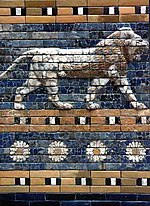Culture of Iraq
This article needs additional citations for verification. (February 2017) |
| Part of a series on the |
| Culture of Iraq |
|---|
 |
| History |
| People |
| Languages |
| Cuisine |
| Religion |
| Art |
| Literature |
| Sport |
|
The Culture of Iraq (Arabic: ثقافة العراق) or The Culture of Mesopotamia is one of the world's oldest cultural histories and is considered one of the most influential cultures in the world. The region between the Tigris and Euphrates rivers, historically known as Mesopotamia, is often referred to as the Cradle of civilisation.[1] Mesopotamian legacy went on to influence and shape the civilizations of the Old World in different ways such as inventing writing.[2] Iraq is home diverse ethnic groups and has a very long and rich heritage. The country is known for its poets، architects، painters and sculptors who are among the best in the region, some of them being world-class. Iraq is known for producing fine handicrafts, including rugs and carpets among many other things.
Additionally, Iraq embraces and celebrates the achievements of its past in pre-Islamic times as well as in Islamic times during Islamic Golden Age when Baghdad was the capital of the Abbasid Caliphate.
Art[]

Iraq's art has a deep heritage that extends back in time to ancient Mesopotamian art. Iraq has one of the longest written traditions in the world including architecture, literature, music, dance, painting, weaving, pottery, calligraphy, stonemasonry and metalworking.
For centuries, the capital, Baghdad was the Medieval centre of the literary and artistic Arab world, but its artistic traditions suffered at the hands of the Mongol invaders in the 13th century. Baghdad evolved into a significant cultural, commercial, and intellectual center of the Muslim world. This, in addition to housing several key academic institutions, including the House of Wisdom, as well as hosting a multiethnic and multireligious environment, garnered the city a worldwide reputation as the "Centre of Learning".[3]
Languages[]

The main languages spoken in Iraq are Mesopotamian Arabic and Kurdish, followed by the Iraqi Turkmen/Turkoman dialect of Turkish, and the Neo-Aramaic languages (specifically Chaldean and Assyrian).[4] Arabic and Kurdish are written with versions of the Arabic script. Since 2005, the Turkmen/Turkoman have switched from the Arabic script to the Turkish alphabet.[5] In addition, the Neo-Aramaic languages use the Syriac script. Other smaller minority languages include Mandaic, Shabaki, Armenian, Circassian and Persian.
According to the Constitution of Iraq (Article 4):
- The Arabic language and the Kurdish language are the two official languages of Iraq. The right of Iraqis to educate their children in their mother tongue, such as Turkmen, Syriac, and Armenian shall be guaranteed in government educational institutions in accordance with educational guidelines, or in any other language in private educational institutions.[6]

Sumerian (